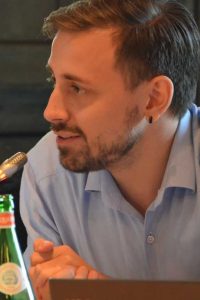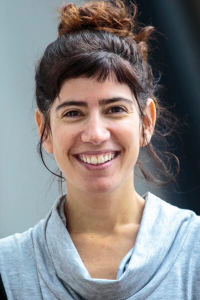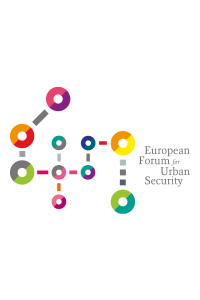CHAMPIONs is supported by an international and interdisciplinary expert and advisory board.

Sonya Reines-Djivanides
Sonya Reines-Djivanides has been the Executive Director of EPLO since April 2015. She is a peacebuilding professional with fifteen years of experience in international conflict resolution. Prior to joining EPLO, she was the Director of Search For Common Ground’s (SFCG) Brussels Headquarters, managing European fundraising, liaison, advocacy and programme support. She also managed the development and implementation of SFCG’s Track II programmes. Sonya holds a Master of Arts in International Relations with focus on International Conflict Negotiation and an advanced Certificate in International Conflict Management from the Maxwell School of Citizenship and Public Affairs at Syracuse University.

Jasmin Hasic
Jasmin Hasić is an assistant professor at Sarajevo School of Science and Technology, department of Political Science and International Relations. He also serves as the Executive Director of the Humanity in Action office in BiH. He has completed professional trainee- ships at the European Parliament and the Bosnian Embassy in Brussels, and done consulting work with several international organizations, includ- ing International Organization for Migration (IOM), United Nations Development Programme (UNDP), and the World Bank. He holds a PhD in Political Science from the Universite libre de Bruxelles and Libera Università Internazionale degli Studi Sociali Guido Carli (LUISS) Guido Carli of Rome. He completed his undergraduate education at Masaryk University in the Czech Republic in International Relations and European Studies, and holds an MA degree in Political Science from Central European University in Budapest. He also holds an LLB and an LLM from the University of Sarajevo. He is an alumnus of the United Nations Alliance of Civilizations (UNAOC) Fellowship in New York, the British- Bosnian Fellowship in London, and the Humanity in Action Diplomacy and Diversity Fellowship in Washington and Paris. His research interests revolve around diaspora studies, peacebuilding, and demographic changes associated with post-conflict migration.

Richard McNeil-Willson is a Research Associate at the Robert Schuman Centre for Advanced Studies, the European University Institute, Florence. He works primarily on the BRaVE Project, a European Commission project which explores issues of extremism, polarisation and counter-extremism in Europe. He completed a PhD at the Institute of Arab and Islamic Studies, University of Exeter, as an Economic and Social Research Council (ESRC) scholar, exploring the impact of counterterrorism programmes, policy and policing on Islamist organisations in Britain and Denmark.
Richard holds additional degrees from the universities of Edinburgh, Durham and Exeter (UK) and has been a Visiting Fellow at Scuola Normale Superiore (Italy) and the University of Aarhus (Denmark). He has had intensive Arabic language training from top private institutes in the Middle East, and conducted fieldwork in Tunisia, Jordan and Palestine. Fieldwork has resulted in academic publications on extremism, political violence and counterterrorism policies, published with Palgrave Macmillan, Manchester University Press and Edinburgh University Press.

Douglas Wells
Doug is a researcher at the Centre of Excellence in Terrorism, Resilience, Intelligence & Organised Crime.
He graduated from Lancaster University with an MA in ‘Conflict Development and Security Studies’, as well as a BA in ‘History, Philosophy and Politics’. Over the past three years he has have developed training packages for open source intelligence for Europol and UK law enforcement, created radicalisation awareness toolsets for European security projects, and worked alongside teams in the NCA, PSNI, Joint Forces Intelligence Group and the Home Office to develop intelligence solutions for C.T, D.E and O.C.G threat vectors.
Much of his research is in close collaboration with law enforcement, defence and other security stakeholders for situational awareness and intelligence services. Currently, Doug is also researching a PhD part-time on the use of internet investigations to counter violent extremism and terrorism in the UK. He has produced several publications on the topics of open source intelligence and counter terrorism, he is a recent editor of the book: Investigating Radicalisation Trends.

Dahlia Simangan
Dahlia is an Assistant Professor at Hiroshima University’s Network for Education and Research on Peace and Sustainability (NERPS) and Graduate School for International Development and Cooperation (IDEC). Prior to that, she was a Japan Society for the Promotion of Science (JSPS) postdoctoral research fellow at the United Nations University–Centre for Policy Research (UNU-CPR) in Tokyo. She obtained her Ph.D. in International, Political, and Strategic Studies from the Australian National University in 2017.
Dahlia’s interest in peace and conflict studies includes topics on peacebuilding, the United Nations peace operations, the Asia Pacific in the Anthropocene, and human rights issues in the Philippines. She has studied various peacebuilding components in Cambodia, Kosovo, and Timor-Leste, such as transitional justice, mine action, security sector reform, and good governance. She also started examining the involvement of everyday peace perspectives into the rebuilding process in Marawi City.

Moritz Konradi
Moritz Konradi holds a “Diplom” (MA equivalent) in political science from the Free University of Berlin (Freie Universität Berlin) and an MA in Criminology and Police Science from the University of the Ruhr in Bochum (Ruhr Universität Bochum). He worked as a programme manager at a Berlin-based NGO specialised in preventing LGBT* hate crime and bias motivated violence, supporting victims and training prevention specialists. He was also lecturer at the Otto Suhr Institute for Political Science and the Berlin police school.
As an Efus programme manager, Moritz follows the topics of discriminatory violence, radicalisation, violent extremism and harm reduction. He currently pilots, among others, the projects “PREPARE – Preventing Radicalisation through Probation and Release” and “BRIDGE – Building Resilience to Reduce Polarisation and Growing Extremism” which accompany more than 20 European local and regional authorities in reinforcing their PVE strategies and mechanisms.
He has contributed to publications on radicalisation, violent extremism, discriminatory violence and drug policy.

Rositsa Dzhekova
Rositsa has over ten years of experience in security research, policy analysis and consultancy across the private, academic and non-government sector. She heads the CSD Security Program and manages its research and policy development activities in the area of EU criminal justice, security and home affairs. Her areas of expertise include radicalisation and counter-terrorism, P/CVE, as well as organised crime, asset forfeiture, irregular migration, policing and border control.
Rositsa is leading CSD’s research and policy work on countering radicalisation, violent extremism and terrorism since 2014. She is member of the expert pool of the Radicalisation Awareness Network (RAN), as well as of the European Expert Network on Terrorism Issues (EENeT). She has managed and contributed to in-depth studies of the pathways and drivers of radicalisation that may lead to violence, on the crime-terror nexus, as well as on developing practitioners’ tools for monitoring and assessing radicalisation and extremist trends and risks, which have been included in the RAN Collection of promising practices. She was a member of the inter-institutional working group at the Bulgarian Ministry of Interior for development of the National Strategy for Countering Radicalisation and Terrorism 2015-2020, where she had a key role in developing the prevention strand of the strategy and action plan. Recently she supported the German Agency for International Cooperation (GIZ) with assessing violent extremism risks in Jordan and appropriate mitigation measures. She is currently involved in a project developing an integrated approach and a mentorship model for the prevention and management of radicalisation in prison and probation, implemented in 5 EU Member States. Rositsa is also contributing to the Horizon 2020 GREASE project (Radicalisation, Secularism and the Governance of Religion: Bringing together European and Asian Perspectives). She further coordinates the YouthRightOn initiative in Bulgaria, aimed at building resilience among youth towards far-right messaging online.
Rositsa previously worked as a political analyst and business consultant in the field of integrity, political, security and terrorism risk in Eastern Europe and the Western Balkans. She holds an MA in Social Research (Distinction) from the University of Sheffield, UK and a BA in Political Science from the Free University Berlin, Germany.

Gregory Reichberg
Gregory M. Reichberg is Research Professor at the Peace Research Institute Oslo (PRIO) and Adjunct Professor in the Department of Political Science at the University of Oslo. He heads the Oslo-based Research School on Peace and Conflict (a consortium that offers doctoral courses) and is an associate editor of the Journal of Military Ethics.
From 2009-2012 he was director of the PRIO Cyprus Centre in Nicosia, where he coordinated research and dialogue activities on the search for a political settlement to the island’s division. Over the last ten years he has been engaged in religious dialogue on social/political issues in Iraq and other settings.
Reichberg’s published work includes a monograph Thomas Aquinas on War and Peace (Cambridge University Press, 2017), and several co-edited volumes: Religion, War, and Ethics: A Sourcebook of Textual Traditions (Cambridge University Press, 2014); World Religions and Norms of War (United Nations University Press, 2009); and The Ethics of War: Classic and Contemporary Readings (Blackwell Publishing, 2006).
In 2018 his published essays include: “Historiography of Just War Theory,” in Oxford Handbook of the Ethics of War”; “Charles Journet on the Impossibility of Christian Holy War,” in Nova et Vetera (English edition); “Jacques Maritain–Christian Theorist of Non-Violence and Just War, in Journal of Military Ethics; “Threats and Coercive Diplomacy: An Ethical Analysis” (with Henrik Syse), in Ethics and International Affairs; and “Reframing the Catholic Understanding of Just War: Two Contrasting Approaches in the Inter-War Period,” in Journal of Religious Ethics.

Luca Váradi
Luca Váradi is a former Marie Sklodowska-Curie research fellow and recurrent visiting professor in the Nationalism Studies Program at Central European University. Her research focuses on ethnic prejudices and especially on the formation of prejudice in adolescence.
Luca Váradi obtained her PhD in sociology at the Humboldt University in Berlin and afterwards served as a research fellow at Humboldt University and the University of Hamburg. She wrote her dissertation about the attitudes of Hungarian teenagers towards the Roma minority that was based on a survey of 1000 students. Her book, ‘Youths Trapped in Prejudice’ was published in 2014 at Springer.
Luca Váradi graduated in 2006 from the Faculty of Social Sciences of the Eötvös Loránd University in Budapest and specialized in ethnic and minority studies. Between 2006 and 2008 she was involved in research on migration and integration and worked for the Hungarian Academy of Science’s Research Institute of Ethnic and National Minorities and for the Menedék Organisation for Migrants. In Germany, she participated in the Interdisciplinary Institute for Conflict and Violence Research’s study on Group-Focused Enmity in Europe. Currently, she is working on a longitudinal study mapping the formation of common social norms in school classes and their effect on the intergroup attitudes of teenagers. Luca Váradi also works together with teachers and NGO-s to utilise research results for school-based intervention programs against prejudice.

The European Forum for Urban Security
The European Forum for Urban Security is the only European network dedicated to fostering discussion, cooperation and support among local and regional authorities in the field of crime prevention and urban security. Founded in 1987, it brings together nearly 250 cities and regions from fifteen countries.
Efus is a major player in strengthening the ability of cities and regions to prevent and counter polarisation and radicalisation. Hence the European Forum for Urban Security contributes to the elaboration and implementation of both a local and a European response to these challenges.
Efus leads the BRIDGE (Building resilience to reduce polarisation and growing extremism – 2019-2021) project, that is co-financed by the European Union Internal Security Fund – Police. The overall objectives of BRIDGE are to raise awareness among local actors and strengthen their capacity to reduce individual and collective vulnerability to radicalisation while at the same time mitigating the phenomenon of polarisation.
Efus is represented in CHAMPIONs International Advisory Board by Elizabeth Johnston Executive Director, Julia Rettig and Eszter Karacsony Programme managers, responsible for the BRIDGE Project.
